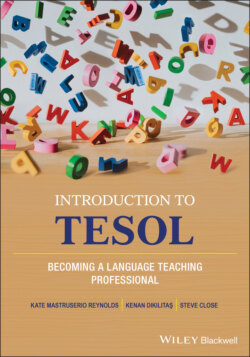Читать книгу Introduction to TESOL - Kate Reynolds - Страница 56
TESOL International Association (TESOL, https://www.tesol.org)
ОглавлениеTESOL International Association (TESOL) became a professional organization for teachers of English as a second/foreign language in 1966. The organization is run by an executive director, president, and board of directors who work with a core team of not-for-profit business and education professionals and organizational members who volunteer on professional councils and governance committees.
TESOL’s mission is to advance “…the expertise of professionals who teach English to speakers of other languages in multilingual contexts worldwide. We accomplish this through professional learning, research, standards, & advocacy” (TESOL International Association, n.d.). TESOL has affiliates in more than 70 countries worldwide from Albania to Venezuela (see more at https://www.tesol.org/connect/tesol-affiliate-network/worldwide-affiliate-directory), which are operated in an independent manner.
TESOL serves members who teach in public and private prekindergarten to high schools, and adults in community colleges, universities, and language schools. It also serves consultants, materials writers, researchers, and teacher educators (those who prepare teachers).
Its professional development offerings include an annual convention held in North America, online courses, seminars and webinars, academies, institutes, and symposiums. The annual convention draws between 6,000 and 10,000 international participants and offers hundreds of sessions on areas such as culture, digital learning, oral language, materials development, program administration, literacy, assessment, vocabulary, and grammar. The convention has ample opportunities for networking and learning about textbooks and other publications in the field.
TESOL academies are intensive topic-focused workshops held worldwide. These academies are usually requested and developed by a school district, school, or group of individuals (e.g., affiliate) on a specific topic. Their institutes are 2-day workshops on a wide variety of topics of interest to teachers. The TESOL symposiums are 1-day programs related to a topic identified by a regional affiliate with a keynote speaker and face-to-face interaction.
TESOL offers online certificate programs, such as the TESOL Core Certificate Program, the TESOL Certificate: Advanced Practitioner, and the Developing an Online Teaching Program. These certificates are not teaching licenses or endorsements that are issued by governmental offices; rather, they are additional credentials to extend one’s professional knowledge and skills.
TESOL advances the profession through publications of journals on research and practice (e.g., TESOL Quarterly, TESOL Journal), electronic newsletters (i.e., TESOL Connections), and books (e.g., Integrating Language and Content, Pedagogy and Practice for Online English Language Teacher Education, Transforming Practices for the Middle School Classroom, and Standards for Initial TESOL pre-K–12 Teacher Preparation Programs).
TESOL supports research in second language teaching, learning, and assessment through mini-grants and the TESOL/the International Research Foundation for English Language Teaching (TIRF) Research Symposium.
Finally, TESOL engages in advocacy for the profession and for ELLs through its annual Advocacy and Policy Summit. Professionals convene in the Washington, DC area and learn about how to advocate with governmental representatives and to understand the shifting landscape of laws pertinent to education, language learning, and learners.
